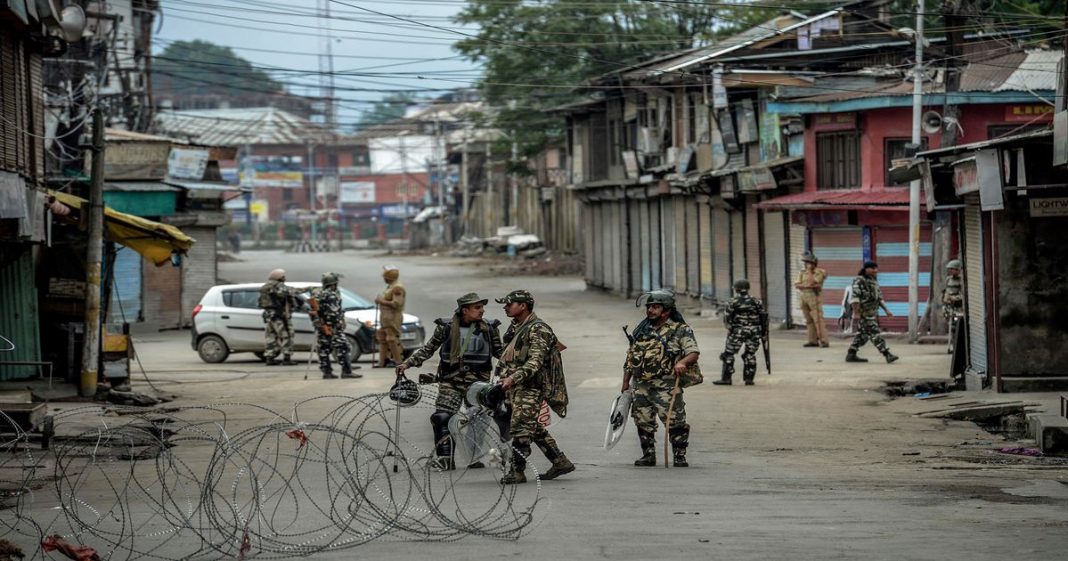Kashmir dispute has been allowed to fester under the watch of international community and its established principles, which culminated in unending gross violation of human rights, outright denial of the right of self-determination and exhaustion of Kashmir’s freedom demand.
Wolfgang F. Danspeckgruber of Princeton University says;
“No other concept is as powerful, visceral, emotional, unruly and steep in creating aspirations and hopes as self-determination.”
Decades long conflict
For the last seven decades, Kashmiris have been out rightly denied their basic right to determine their own government, formulate their own policies and rule their region based upon their aspirations. The heavy-handed tactics and sheer brutality have been unleashed by the Indian state to quell any desire or prospect of freedom and the right to self-determination. The Kashmir saga erupted in the last days of colonial rule with the availability of only two options; either to join India or Pakistan. With majority of population as Muslim, Kashmir was very much likely to fall into the lap of Pakistan but the wily tactics of Mountbatten in corroboration with Jawaharlal Nehru deprived Pakistan of its destined fruit. Eventually, the skirmishes morphed into a war between two newly carved-out neighbors which was put to halt with the timely intervention of United Nations.
Read more: Pakistan’s new political map: Implications for Kashmir, backlash from India
UN decided to hold a referendum in the disputed regions of Jammu & Kashmir where people would decide the future status of their territory. India militarized the region by airlifting thousands of troops in the region and till now, has not agreed to hold a referendum. Pakistan has supported the Kashmiris right to self-determination and has strongly protested the nefarious designs of subjugation by the Indian state. Several efforts have been introduced by the UN and Pakistan, but none has borne fruit yet. India regards the region as its integral part and has nixed all demands to hold a referendum. It has raised huge concerns over the attitude adopted by the Indian state and the behavior meted out to the indigenous populace of Kashmir. Unilateral abrogation of Kashmir’s special status and chopping down all hopes of negotiation are not ominous signs for Kashmir’s future as well as the bilateral relations of neighboring states.
Indian state is adamant to thwart any effort on the behalf of Pakistan to solve the prolonged dispute
Indian PM Jawaharlal Nehru made oral and written pledges of free exercise of right of self-determination. He spoke at a large congregation at Lal Chowk in Srinagar where he promised referendum to the local populace. However, the promise didn’t see the light of the day. Nehru’s telegram to Prime Minister Liaquat Ali Khan dated 30th October 1947 states;
“Our assurance that we shall leave …. the decision about the future of state to the people is not merely a pledge to your government but also to the people of Kashmir and to the world.”
Pakistan’s stance on Kashmir
From the very first day, Pakistan’s stance has been to ensure that the people of Kashmir get their due right to determine their own future and fate in line with their aspirations. Quaid e Azam believed that Pakistan would be incomplete without the inclusion of Kashmir in its fold. The successive governments have strived hard to raise voice for the suppressed community and to internationalize the Kashmiris’ right of self-determination. All the leaders have taken the dispute to the international organizations, media and civil society to awaken their conscience and so they could play their role in checking the unilateral action of Indian government. Time and again, Pakistan has raised this matter at UN and other regional organizations. It has warned the world community of the long-simmering desperation which can explode into a war between neighboring countries.
Read more: Pakistan urged to appoint special envoy on Kashmi
Pakistan has remained resilient on its commitment to the United Nations to resolve Kashmir dispute through holding a plebiscite which would guarantee the right to choose whichever way the valley would go. When India abrogated the Article 370 and 35A, Pakistan strongly opposed the unilateral move as it contrived to make UNSC Resolutions irrelevant. The successive governments, time and again, reiterated Pakistan’s stance on Kashmir in line with the 1948 UN Security Council Resolutions. India has tried to shove the human rights matter under the carpet many a time, but Pakistan remains determined to raise the matter at UN as well at international level.
India’s desperate attempts to keep Kashmir
On the other hand, India, first annexed the valley under the pretext of Maharaja’s request for seeking Indian help against tribal fighters and later introduced the policy of rigged elections to maintain stronghold on the land. The people were given false hopes and deceived promises of holding a referendum. Almost everyone, except Pakistan, bought this idea. It didn’t bode well for those even who co-conspired the promulgation of Indian rule over the valley e.g. Sheikh Abdullah of National Conference. Resultantly, India kept huge military presence in the region under the guise of security concerns which was maintained to quell any seed of freedom. Hundreds were abducted and incarcerated for decades. The nefarious exercise even continues today.
Read more: Demographic change: The constant Kashmiri fear
Moreover, Indian illegal occupation of the valley heralded an era which led to bloodbath, genocide and clearing the region off any dissenting voice on many instances. The heinous crimes were conducted to deny the rights to the populace. The numbers are heart wrenching and shocking. In a 1993 report, Human Rights Watch stated that “Indian security forces assaulted civilians during search operations, tortured and summarily executed detainees in custody and murdered civilians in reprisal attacks.” Security forces target civilians and women to punish and humiliate the whole community. Recently, an image surfaced on the internet where a weeping child was seen sitting on the dead body of his grandfather allegedly killed by security forces. What people demand, is freedom and it cannot be quelled or quashed by the blatant use of force and strength.
The international community must play its due role in ensuring the right of self-determination to the Kashmiris and compel India to abide by the principles envisaged in the United Nations Charter Article VI
To add more miseries to the Kashmiris, the rise of Hindutva in India is posing dangerous threats to the very existence of Kashmiris and Muslims, let’s forget holding a plebiscite. The Hindutva’s rise under the auspices of Bhartya Jantaya Party (BJP) has generated shockwaves in the region. Modi’s autocratic act of stripping Kashmir off its special status on 5th August 2019 reeks of abhorrent and wicked plans regarding the future of the valley. He has made no regard for the UN Security Council Resolutions to resolve dispute with all parties involved or the promises made by the founding fathers of the Indian nation to the Kashmiri populace, Pakistan and the world. For instance, this act is complete negation to what Mahatma Gandhi said as, ‘The will of Kashmiris is the supreme law of land.’
Read more: Kashmir black day: A day to protest Muslim genocide in IOK
Let’s not forget that the unilateral move of rescinding Article 370 is also a blatant violation of bilateral agreements between neighboring states as well as impugned to the UN Resolutions. This act cannot be condoned, under any circumstances.
International community must step in
Furthermore, realization of the right of self-determination is not only a moral imperative but also a legal obligation. The international community must play its due role in ensuring the right of self-determination to the Kashmiris and compel India to abide by the principles envisaged in the United Nations Charter Article VI – equal treatment of all groups and providing right of self-determination to all communities and states. Amnesty International and Human Rights Organizations – the international watchdogs – have time and again raised the issues of human rights violation in Kashmir. The dissenting voices are suppressed under the draconian laws and any desire of freedom is crushed by the military strength in the region. This malpractice needs to be thwarted before it’s too late.
Concluding thoughts
To conclude, the Kashmir dispute lingers on and the world watches. Indian state is adamant to thwart any effort on the behalf of Pakistan to solve the prolonged dispute. People of Indian held Kashmir continue to reel under the clutches of an ethno-nationalist regime; global community and its institutions must not shirk from their collective responsibility. It is a moment of reckoning for the world. The outright denial to comply with the UNSC Resolutions, International Conventions, promises of Indian founding fathers and bilateral agreements with respect to Kashmir are signs of amateurish, crude and unjust attitude adopted by India. Discarding special status of Kashmir and imposition of curfew along with gross human rights violations are adding heaps of miseries on the Kashmiri people. The Kashmir awaits!
Read more: Kashmir just one part of Modi’s broader anti-Muslim agenda: HRW chief
“History suggests that the will of people may be somewhat dulled by the state power but can never be controlled and curbed. It will raise its head, time and again, under different disguises.” – Yasin Malik (Chairman Jammu & Kashmir Liberation Front).
The author has done BA Hons in Political Science from GCU Lahore and is currently pursuing a Law degree at Punjab University Law College.














